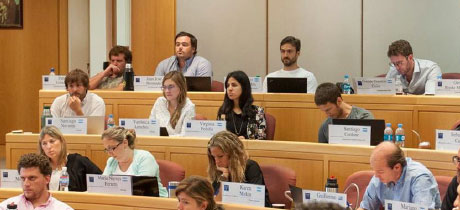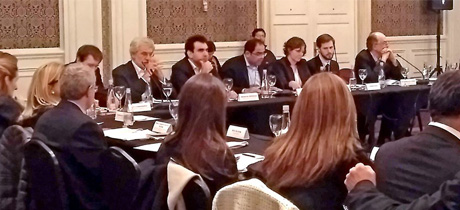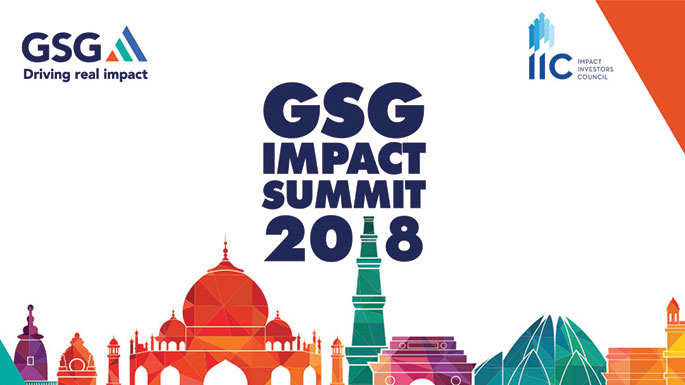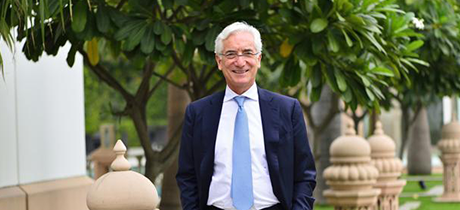

PRESS RELEASE
Kenya backs National Advisory Board to ‘co-create policy interventions for inclusive and sustainable development through impact investment’
Global Steering Group for Impact Investment convenes inaugural Kenya Impact Dialogue with over 200 delegates
Nairobi, Kenya 10 December 2018 – The Global Steering Group for Impact investment (GSG) convened its inaugural Kenya Impact Dialogue on Monday, seeing over 200 impact investors, social entrepreneurs, development finance specialists and policy-makers discuss the need for a coherent approach to impact investment in Kenya.
In the Special Keynote address, Ms. Betty Maina, Special Secretary to the State Department for Industrialization, Republic of Kenya, said:
“The formation of National Advisory Boards (NABs), presents an opportunity to identify opportunities and resolve challenges faced by impact investors and entrepreneurs by engaging policymakers and informing the development of national impact investment strategies.”
“We appreciate the platform provided by GSG for countries engagement to co-create policy interventions for inclusive and sustainable development through impact investment,” she added.
IMPACT TO PLUG SDG FINANCING GAP
Maryanne Ochola, East Africa Regional Chapter Manager at Aspen Network of Development Entrepreneurs (ANDE), kicked off proceedings with a wake-up call, saying: “Ladies and Gentlemen, we are running out of time… running out of time to eradicate poverty.”
“We have a financing gap of $2.5 trillion towards the development of the UN Sustainable Development Goals (SDGs)… We need to acknowledge that governments can’t do this alone and we need private capital to meet societal needs,” she added.
“Impact Investment affords us the opportunity to unlock financial and social good,” she said.
Globally, impact investment has grown by 41% in terms of compound annual growth rate (CAGR) to reach over $250 billion in assets under management (AUM). But that’s a “drop in the ocean” and the capital is “skewed towards large ticket sizes”, she said. “Small and growing businesses can transform an economy,” she added. “Today is a call to action to all of you as impact leaders.”
In the Welcome Address, Susie Kitchens, the British High Commissioner, said that the SDG’s are facing a global annual investment gap of $2.5 trillion per year. But it must be remembered that impact investment is not a replacement for public spending. Kenya is a regional hub for impact investing, being the third largest private equity market in sub-Saharan Africa, she noted.
“We have a great opportunity to shape the landscape…to drive forward the equitable march of progress to drive prosperity and security. We need bankable, investment-ready projects,” she added.
Between now and 2030, Kenya can unlock $6 billion in impact capital to fund the Sustainable Development Goals (SDGs), said Global Steering Group for Impact Investment CEO Amit Bhatia.
In an interview on CNBC Africa, Mr Bhatia noted Kenya has seen over $4.2 billion of impact investment flow into the country over the past 10 years. Within the African continent, Kenya has consistently attracted over half the total impact capital.
“This groundswell of impact investment is addressing issues such as poverty and climate change using private capital for public good. That’s the message we are bringing to Kenya this week,” he said.
“This is a great opportunity for Kenya to figure out how it can find the resources to unlock private capital, including how the government can create [impact investment] wholesalers.
IMPACT MOVEMENT TAKING SHAPE
In the Theme Address, GSG CEO Amit Bhatia stressed that the impact movement has the same core characteristics as other successful movements have, with the simple premise that it can be understood by all.
“All movements are replicable and decentralized… all successful movements are inclusive and abiding – they engage all citizens, all actors, irrespective of caste, religion, nationality etc.,” he added.
“The impact movement is inclusive, the left, the right, big businesses, small businesses…. We need to bid goodbye to aid and donor – we need to fix capitalism first,” Mr Bhatia added.
GSG SOLVING DEVELOPMENT CHALLENGES
Ms. Betty Maina said: “We as governments ponder on the best way to address the ever demanding economic, social and environmental challenges.
“With the ever-diminishing fiscal space, it is evidently clear to many governments around the world that we can no longer rely on the public sector resources. Private equity and venture capital, beside philanthropy, is increasingly becoming an important complement to scale up impact investments through collaborative action by making the needed policy changes,” she said.
THE IMPORTANCE OF EDUCATION FUNDING
Dr Shannon May, founder of the Bridges Academy, said: “Education should be in your portfolio if it isn’t yet – there are 300 million children in school not reading. We need something to change.”
“Expand your portfolio, invest in education and join the GSG to see Impact investment expand” across the African continent,” she added.
ENTREPRENEURSHIP AND IMPACT
In the first panel discussion, on Entrepreneurship and Impact, Dr. Githinji Gitahi, Global CEO of Amref Health, said many donors are asking for “sustainability and co-creation”, which has “changed the game for us”.
“When we have profits, we need to be shy and hide it. We might otherwise be labelled as profiteers,” he said. “Right now, we have included the private sector in agenda 2030 – we see the private sector as a key driver in this.”
“We take young entrepreneurs in healthcare, and we offer them to test their model with access to Amref’s staff and networks. This network is important when going into impact investment.”
Sanergy Founder and CEO David Auerbach said: “I am not seeing many impact investors willing to come in when it’s just an idea – this is very different from the Silicon Valley-type view – then it’s your responsibility as an entrepreneur.”
Continuing, Robert Karanja, Lead, The B-Team Africa, said “Governments provide an enabling environment, but we’ve seen corporates encourage young people to be their (own) bosses.
“We provide an alternative to people in this country and not only go to school and be employed but also being their own bosses – they might not be enough job opportunities for people coming out of the market, we are driving towards bringing different mindset.”
SOLVING SOCIAL PROBLEMS THROUGH IMPACT
In the second Keynote Address, Private Capital for Public Good, Ambassador Martin Kimani, Director of Kenya’s National Counter Terrorism Centre and Special Envoy CVE, asked: “How will your work reinforce the institutions, how will your work help us do a better job?”
“The impact movement needs to be informed by what’s local and specific. Social enterprises must work with government and work with the political institutions that stop terrorism,” he said.
Amar Inamdar, Managing Director at KawiSafi Ventures, said in the Capital and Impact keynote speech that impact markets represent a “tremendous opportunity to solve problems”.
“Let’s crowd each other in,” he said. “East Africa is a hotbed of opportunity,” he added, naming mobile payments company Mpesa as a prime example. “Capital will flow… to the highest return and lowest risk and there is a huge opportunity to demonstrate and a huge opportunity to lower the risk.”
TIME FOR A KENYAN NAB
In the Closing Panel on Building a Kenyan NAB, Arif Neky, Senior Advisor – UN Strategic Partnerships Coordinator – SDG Partnership Platform, said: “We would be delighted to support as the NAB in Kenya is established. I think GSG has come to town at the right time.”
He highlighted the need “create practical ecosystems for partners on the ground.” Kenya’s government announced the creation of an SDG platform to create a platform for this ecosystem to happen.
Duncan Onyango of Acumen said any NAB “should embrace its convening power – the right people at the right time. How to ensure we get local funds moving into the sector –- [the NAB] will ensure that.”
Peter Oloo, CEO of the Social Enterprise Society of Kenya, agreed, “The Kenyan NAB has really come at the right time.” Kenya has the charity act – “We need the policy and legal framework in place for everything else to fall in place.”
Mr Neky continued: “We need to focus on those which have been left behind, looking at the SDG partnership platform to identify bankable projects that help address some critical issues like health and poverty
“We need to aggregate many partners together in one common form and the NAB can help catalyze this. Is there the opportunity to move from pilots – which are puffs of excellence tin a sea of deprivation – how do we make sure that those solutions are in effect?”
GSG is currently setting up a National Advisory Board in Kenya to catalyze impact investment growth. GSG has worked with leaders to launch 22 NABs around the world. They are the vanguard for impact investment and serve as national platforms for private, public, and civil society actors to collaboratively create an enabling environment for impact investing.
Globally, GSG works with these country-led NABs, network partners, and other key stakeholders to identify priorities, deliver initiatives, raise awareness and advocate for the development of impact investing.
As GSG CEO Amit Bhatia told CNBC Africa: “How can we find ways so that impact investors and entrepreneurs are better recognised here, and that the rules and regulations are made more amenable for this hotbed to grow at a very rapid place?”
“For example, if Kenya was to work with us to think about how institutional investor guidelines, for example fiduciary duties for pension funds, can be looked at, that would be amazing.
“Can Kenya make ESG reporting regulations mandatory for corporations, as has happened in many parts of the world, that would be amazing.”
“So, there are many recommendations we are leaving with the government to consider and say ‘we already have a great opportunity’ with Kenya being a hotbed, and now we have to leverage that and take it to the next level.”
CALL TO ACTION
Siddharth Chatterjee, UN Resident Coordinator, in the Closing Keynote, said impact investment is where the private sector can make huge profits.
“We need a Marshall Plan of employment for Africa and this will come not from governments, but from the private sector,” he said.
“Kenya can be in food surplus in the next five years as seeds and technology adapt to climate change… it’s about getting the big players together to invest into these innovations.”
“You need to think big here, it’s about scale – people are being born every day and that means we need to think big, but there is also lots of room of profitable investments through economies of scale.”
“Kenya needs to make itself creditworthy and investor-friendly. The NAB is great because it’s coming from a country that also helped to create the SDGs”.
For media inquiries, and photo and video requests, please contact:
Oliver Wagg, GSG Communications Advisor
Oliver.Wagg@gsgii.org
+44 (0) 7885 377264
Called by the British press a “compassionate capitalist,” “sophisticated and urbane,” and “a man of intellectual distinction,” Sir Ronald Cohen is a trim 72 with wavy white hair, dark eyebrows and an inspiring eloquence that reflects deep thought in the industries and systems around which he orbits — venture capital and impact investing.
Though Cohen strikes one as a veritable English nobleman of our times — he was schooled at Oxford, knighted in 2001 and has been dubbed the Father of Venture Capital in the U.K. — his backstory is anything but predictable. Born in Egypt, Cohen and his family fled the country on the heels of the 1950s Suez Canal Crisis when he was 11 years old.

“It became very difficult to be Jewish in Egypt, because there was an identification of being [tied to] Israel,” said Cohen.
With his boyhood collection of Egyptian stamps gripped at his side and only a few Egyptian pounds in his parents’ pockets, the family settled in England, where his mother had citizenship.
Despite Cohen not yet speaking English, his father enrolled him in a London grammar school and promised the headmaster that, given the opportunity, his son would be top of the class.

G20 DWG / GSG Engagement
Unlocking private capital for public good
The Global Steering Group for Impact Investment (GSG) engaged with G20 Development Working Group (DWG) delegates over a half day meeting in Buenos Aires. Eleven countries (Argentina, Australia, Brazil, Canada, France, Germany, Saudi Arabia, South Africa, Spain, Turkey, and the UK) and three knowledge partners (OECD, World Bank, UNDP) were represented. Under Argentina’s presidency of the G20, the DWG efforts are focused on promoting inclusive economic growth, primarily through Inclusive Business. Inclusive Businesses are those that generate high development impact by (i) improving access to goods and services for the base-of-the-pyramid population; and/or (ii) providing income and/or employment opportunities to low-income people as producers, suppliers, distributors, employers, and/or employees.
Leading consulting firm, McKinsey & Company, Inc., at the request of GSG, presented delegates and meeting attendees with their research, exploring how policymakers in G20 countries can best prime their countries for impact investment to reach Tipping Point by 2020. They identified four key high impact initiatives to accelerate impact investing:
- Unlock more funding
- Consider Governments as a purchaser of social outcomes
- Provide enabling legislation for social enterprises
- Standardise measurement and certification for the industry
A dialogue ensued with key questions arising:
- How can governments be more involved?
- How can private sector investment be unlocked?
- How can we measure impact?
“With GSG National Advisory Boards active in 15 of the G20 countries, we are strongly attuned to supporting the G20 agenda. We believe that collectively the private and public sector can unlock the trillions required in SDG Impact Finance while shaping the Impact economies of the future, built on inclusive business, inclusive finance and inclusive growth”
Amit Bhatia CEO, GSG
“The GSG has supported us to better understand this important topic of impact investment, and we hope the GSG continues such engagements”
Santiago Sueiro Chair, G20 Development Working Group, Argentina
“We strongly support the GSG’s engagement with the inclusive business agenda”
Murat Kors Inclusive Business Steering Committee Chair, Turkey
Global leaders to explore USD 1bn fund of funds to catalyze the LatAm impact investment market
Buenos Aires, July 13, 2018: The Global Steering Group for Impact Investment (GSG) today announced the launch of a task force of Latin American impact investment leaders to explore a “fund of funds” model for supporting social and environmental impact investment in the region.
The Latin America Impact Fund of Funds (LIFF) Task Force will determine the feasibility of a USD $1 billion Fund of Funds to drive social and environmental impact in 20 countries across Central and South America. Once viability has been established,, the LIFF Task Force intends to launch the fund of funds to strengthen the intermediary market “We are delighted that the Task Force will explore this important and innovative Fund of Funds,,” said Sir Ronald Cohen, Chair of the GSG. “This group of leaders in investment and social impact is passionate about improving lives and the environment in Latin America by attracting private capital for public good. I am confident they will help achieve on the aspirations of the continent.”
Latin American countries have made significant progress on key social and environmental fronts over the last decade, but significant challenges remain. By some estimates, about 40 percent of the population live in vulnerable conditions: 115 million people live in informal urban settlements, more than 80 million people are affected by insufficient water supply and sanitation, twenty percent of the regional population lack access to basic healthcare facilities, and nearly ten percent of young people have not completed primary school.
The fund will seek to address these issues by providing patient debt and equity capital to social and environmental impact funds in Latin America. It will pool institutional and retail capital from domestic and international sources and it will be aligned with the UN Sustainable Development Goals.
The announcement was made in Buenos Aires today by GSG Vice Chair & Global Ambassador Alejandro Preusche, who will chair the Task Force.
“I am honored to accept the Chairmanship of the LIFF Taskforce and I am confident that we will attract the region’s finest talent to assess and, hopefully, launch this much-needed impact Fund of Funds,” said Preusche. “As the first of its kind in the region, the LIFF will offer new approaches to tackle some of the region’s most intractable challenges. We are excited to begin our work and look forward to sharing the results widely.”
Other members of the LIFF Task Force include chairs of the GSG’s current National Advisory Boards (NABs) in the region: Maria Laura Tinelli (Argentina/Uruguay); Beto Scretas (Brazil); Angelica Zegers (Chile); and Rodrigo Villar (Mexico). They will be joined by GSG CEO Amit Bhatia.
The GSG is incubating two similar-sized initiatives in India — the India Education Outcomes Fund and the India Impact Fund of Funds — as well as an Education Outcomes Fund in Africa and the Middle East.
About GSG: gsgii.org
The GSG is an independent global steering group catalyzing impact investment and entrepreneurship to benefit people and the planet. The GSG was established in August 2015 as the successor to and incorporating the work of the Social Impact Investment Taskforce established under the UK´s presidency of the G8. The GSG currently has 18 National Advisory Boards, with 17 countries plus the EU as members. Chaired by Sir Ronald Cohen, the GSG brings together leaders from the worlds of finance, business and philanthropy.
For further information, please contact:
GSG: Meg Massey, Director of Communications
meg.massey@gsgii.org, +1 202 827 5712
LONDON/ NEW DELHI – Following elections, the Global Steering Group for Impact Investment (GSG) announces that six new Trustees will join its Board which, subject to approval by the UK Charities Commission, will increase to nine trustees from seven countries and four continents.
“As the GSG leads the world towards impact investing’s Tipping Point in 2020, the global leadership of our Board is crucial to our movement’s success.” said Sir Ronald Cohen, GSG’s co-founder and chairman. “Our new Trustees-elect bring the innovative vision and energy they have demonstrated in their home countries to leading our global movement.”
These appointments precede the GSG’s fourth annual Impact Summit, The Power of Impact: Driving to Tipping Point 2020, will take place in New Delhi, India, on 8-9 October 2018.
“We are delighted to bring our Impact Summit to New Delhi,” said Amit Bhatia, CEO of GSG. “The entrepreneurial energy and appetite for social change that characterize India today make it the perfect place to harness the power of impact in addressing the great challenges our global community faces.”
Following formal approval, the six new Trustees will join Sir Ronald Cohen, Nicola Cobbold, and Nick O’Donohoe as members of the Board of Trustees. They are:
- Brigitte Mohn, Executive Board Member of Bertelsmann Stiftung (Founding NAB Chair, Germany)
- Darren Walker, President of the Ford Foundation (NAB Chair, United States)
- Giovanna Melandri, Founder and President of the Human Foundation (NAB Chair, Italy)
- Masataka Uo, Founder and CEO of the Japan Fundraising Association and of Fundrex Co., Ltd. (NAB Vice Chair, Japan)
- Rosemary Addis, Executive Director of Impact Strategist (NAB Chair, Australia)
- Uli Grabenwarter, Deputy Director of Equity Investments at the European Investment Fund (Advisory Board Chair, EU)
ABOUT THE GLOBAL STEERING GROUP FOR IMPACT INVESTMENT (GSG)
The GSG is an independent global steering group catalyzing impact investment and entrepreneurship to benefit people and the planet. The GSG was established in August 2015 as the successor to and incorporating the work of the Social Impact Investment Taskforce established under the UK’s presidency of the G8. The GSG currently has 18 member countries, as well as active observers from leading network organizations. Chaired by Sir Ronald Cohen, the GSG brings together leaders from the worlds of finance, business and philanthropy.
ABOUT THE GSG’S NEW TRUSTEES-ELECT
Dr. Brigitte Mohn
Dr. Brigitte Mohn is the daughter of Bertelsmann Stiftung founders Liz Mohn and the late Reinhard Mohn (1921–2009). She studied political science, art history and German philology at the universities of Bamberg, Munster and Augsburg, earning a Master of Arts in 1991 and subsequently a doctorate. In 2001 she received an MBA from the Otto Beisheim School of Management in Koblenz and the Kellogg Institute in the United States.
Her career has included positions with the Kiel Institute for the World Economy; Bantam, Doubleday and Dell Publishing in New York; McKinsey in Hamburg; and Pixelpark in Switzerland.
Since 2001, she has served as chair of the German Stroke Foundation’s Executive Board. In 2002, she also became director of the Health program at the Bertelsmann Stiftung. She has been a member of the Bertelsmann Stiftung Executive Board since January 1, 2005.
Darren Walker
Darren Walker is president of the Ford Foundation. Before joining Ford, Darren was vice president at the Rockefeller Foundation, overseeing global and domestic programs including the Rebuild New Orleans initiative after Hurricane Katrina. In the 1990s, as COO of the Abyssinian Development Corporation—he oversaw a comprehensive revitalization strategy, including building over 1,000 units of affordable housing and the first major commercial development in Harlem since the 1960s. Earlier, he had a decade-long career in international law and finance at Cleary Gottlieb Steen & Hamilton and UBS.
Darren co-chairs New York City’s Commission on City Art, Monuments, and Markers, and serves on the Commission on the Future of Riker’s Island Correctional Institution and the UN International Labor Organization Commission on the Future of Work. He also serves on the boards of Carnegie Hall, the High Line and the Committee to Protect Journalists. He is a member of the Council on Foreign Relations, the American Academy of Arts and Sciences and the recipient of thirteen honorary degrees and university awards, including the W.E.B. Du Bois Medal from Harvard University.
Giovanna Melandri
Giovanna Melandri, President and founder of Human Foundation, was a member of the Italian Parliament from 1994 to 2012 and has held the position of Minister for Culture (1998- 2001) and Minister for Youth and Sport (2006-2008).
During her political career, she has been mostly engaged in international relations, cultural affairs, human rights, youth policies, sport and environment. She has developed close cooperation with other multilateral organizations, such as UNESCO and WADA (World Anti-Doping Agency), whose creation she has successfully advocated for.
Giovanna started her career at Montedison study center where she worked from 1985 to 1988 and from 1982 to 1994 she was a member of the National Secretariat of Legambiente. Since November 2012, Giovanna was nominated President of the MAXXI Foundation for contemporary arts. Giovanna graduated cum laude in Economics at the University of Rome “La Sapienza” and was awarded an H.C. degree from the John Cabot University in 2000. In July 2003, she was awarded by the French President Jacques Chirac with the title of “Officier de la Legion d’Honneur”.
Masataka UO
Masataka UO is the Vice Chair of the Japan National Advisory Board for the Global Steering Group for Social Impact Investment. He is also the founder and CEO of Japan Fundraising Association, a nationwide platform that promotes social impact investment and philanthropic giving in Japan, and the founder and CEO of Fundrex.Co.Ltd, a leading consulting company for social impact organizations. The Social Impact Center at the Japan Fundraising Association is performing a pivotal role in creating Social Impact Bonds projects, facilitating Social Impact Measurement Initiatives and advocating a dormant bank account utilization policy.
Aside from serving at the Economic Cooperation Bureau of the Ministry of Foreign Affairs of Japan, he also worked for Japan International Cooperation Agency (JICA)
Rosemary Addis
Rosemary is Executive Director of Impact Strategist and established and Chairs the Australian Advisory Board on Impact Investing and Impact Investing Australia, which have led field building for impact investing in and from Australia since joining the Social Impact Investment Taskforce in 2013.
Over a 30+ year career, Rosemary has held senior roles across sectors, including as an equity partner at Allens-Linklaters, at leading community organisation The Smith Family, in Victorian Government leading national reform and in the Australian Government leading the first social innovation unit (2010-13). She is widely published on policy, innovation and impact investment.
Rosemary is an experienced Chair and Director with a law degree (First Class Honours), the New York Bar (1995), Australian Institute of Company Directors diploma (2002) and international accreditation as a broker of cross-sector partnerships (2005). She has been recognised as one of the world’s leading lawyers (Chambers Global 2000-2002), for contributions to innovation AFR/Westpac 100 Women of Influence (2015), and was a finalist for Thought Leader of the Year in the Women in Finance Awards (2017).
Uli Grabenwarter
Uli is Deputy Director – Equity Investments at European Investment Fund (EIF). In this capacity he oversees EIF’s activities in Impact Investing, Technology Transfer and Venture Capital. He has led the build-up of the Social Impact Accelerator (SIA), the first pan-European social impact investing fund-of-funds and has brought impact investing as a new business line of EIF mainstream, with currently four impact investing product lines under management.
From 2010 to 2012 Uli conducted a 20 months research project on impact investing in collaboration with IESE University of Navarra in Barcelona and the Family Office Circle Foundation based in Switzerland, analysing best-market-practices for impact investing in the private equity and venture capital space. He is a visiting Professor for Venture Capital and Impact Investing at IESE University and regularly publishes articles and white papers. Uli is also chair of the European Impact Investing Luxembourg think-tank platform (www.eill.lu) and member of several expert groups on impact investing and impact metrics across Europe. Uli holds a Master’s degree in Business and Finance of the University of Graz.
ABOUT THE GSG TRUSTEES
Sir Ronald Cohen, Chairman
Sir Ronald Cohen is Chairman of the Global Steering Group for Impact Investment and The Portland Trust. He is a co-founder director of Social Finance UK, USA, and Israel, and co-founder Chair of Bridges Fund Management and Big Society Capital.
For nearly two decades, Sir Ronald’s pioneering initiatives in driving impact investment have catalyzed a number of global efforts, each focused on driving private capital to serve social and environmental good. These efforts are leading the global impact investment movement towards an Impact Revolution.
He chaired the Social Impact Investment Taskforce established under the UK’s presidency of the G8 (2013-2015), the Social Investment Task Force (2000-2010) and the Commission on Unclaimed Assets (2005-2007). In 2012 he received the Rockefeller Foundation’s Innovation Award for innovation in social finance.
He co-founded and was Executive Chairman of Apax Partners Worldwide LLP (1972-2005). He was a founder director and Chairman of the British Venture Capital Association and a founder director of the European Venture Capital Association.
He is a member of the Board of Dean’s Advisors at Harvard Business School and a Vice-Chairman of Ben Gurion University; a former member of the Harvard University Board of Overseers; a former director of the Harvard Management Company and the University of Oxford Investment Committee; a former Trustee of the British Museum; and a former trustee of the International Institute for Strategic Studies.
He is a graduate of Oxford University, where he was President of the Oxford Union and serves as an Honorary Fellow of Exeter College. He has an MBA from Harvard Business School to which he was awarded a Henry Fellowship.
In 2007, Sir Ronald published: The Second Bounce of the Ball – Turning Risk into Opportunity and today is authoring a book on the “Impact Revolution.”
Nicola Cobbold
Since October 2015, Nicola has focused on the current global refugee and migration challenge and the potential role for impact investment tools to help create solutions at scale. This followed nearly eight years as CEO of The Portland Trust, a British non profit ‘action tank’. Previously Nicola worked as a lawyer, specialising in media and copyright. Prior to specialising in media, Nicola worked as a corporate lawyer at Linklaters in London and Paris.
Interspersed with her legal career, Nicola worked in reconciliation and coexistence. In addition to compiling a report for the Truth and Reconciliation Commission in South Africa, she was a trustee (2001-2003) of the Jewish Council for Racial Equality. She has been a governor of the Hebrew University (2010-2013) and a Board Member of Seeds of Peace (2011 – 2014) and the Eastern Mediterranean International School in Israel (2013-15). She was a founding shareholder of Social Finance Israel and is a Trustee of The Portland Trust and The Institute for Jewish Policy Research. She is a steering committee member of the World Commission on Forced Displacement and a member of the CGD Innovative Finance for Resettlement Working Group.
Nicola is a graduate of Cambridge University.
Nick O’Donohoe
Nick O’Donohoe is Chief Executive of CDC and is also a member of the CDC Board. He was previously a Senior Adviser to the Bill and Melinda Gates Foundation where he specialised in the use of blended finance models. Prior to taking this role, Nick co-founded, Big Society Capital (BSC). He served as its Chief Executive Officer from 2011 to December 2015.
Previously Nick worked at JP Morgan, as Global Head of Research. He was a member of the Management Committee of the Investment Bank and the Executive Committee of JP Morgan Chase, as well as the senior sponsor for JP Morgan’s Social Finance Unit. Nick co-authored “Impact Investments: An Emerging Asset Class”, published by JP Morgan and the Rockefeller Foundation. Prior to JP Morgan, he worked at Goldman Sachs.
Nick served as Chairman of the UK Dormant Assets Commission. He is also a board member of the Global Impact Investing Network (GIIN) and Deputy Chairman of the Global Steering Group on Impact Investment.
Nick has an MBA from the Wharton School and a BA in Mathematical Economics and Statistics from Trinity College, Dublin.
For more details, please reach out to:
Meg Massey
Contact: +12028275712
Sukanya Narain
Contact: +917042898247

The GSG, an independent global steering group catalyzing impact investment and entrepreneurship, invites you to its annual summit in New Delhi on 8-9 October. Join over 900 impact leaders from across 50+ countries to discuss the current state of the sector and work together to identify global priorities, key action areas and milestones to take impact investment to tipping point by 2020.
- 2 days of content and networking opportunities
- Over 100 discussion leaders from 25+ countries
- Curated for traditional plenaries and socratic-dialogue styled group discussions


